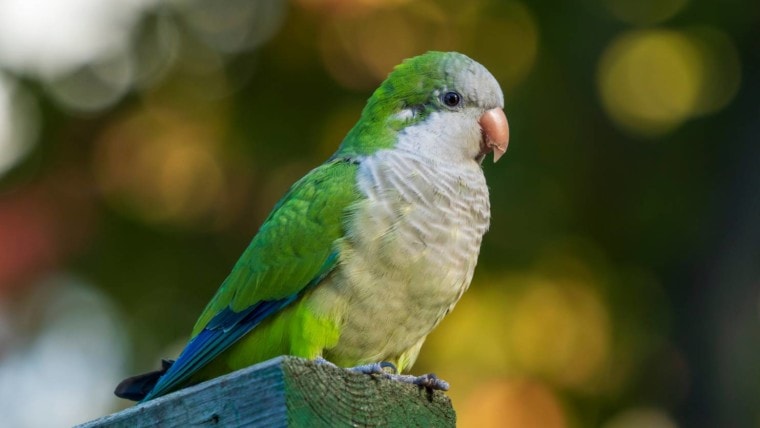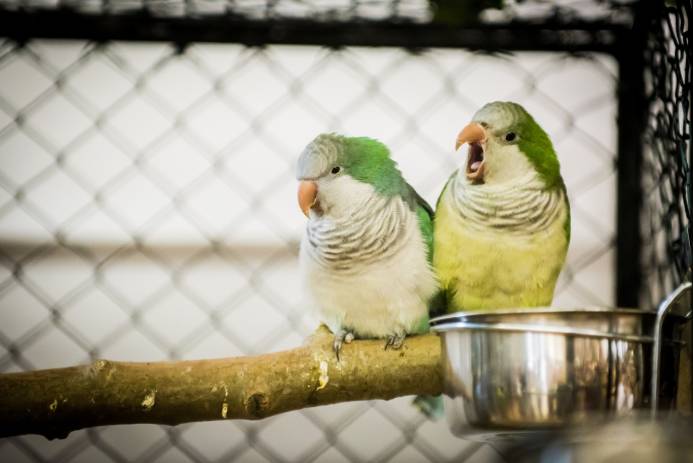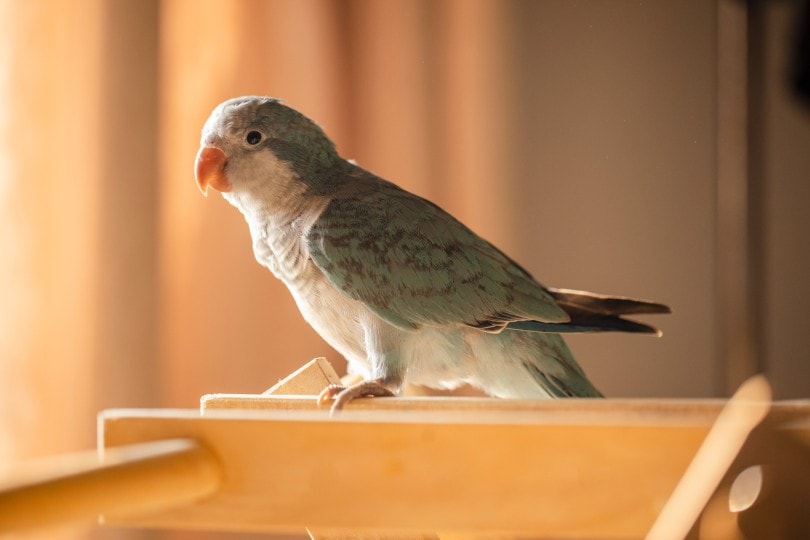
The Quaker parrot was a popular pet in the United States from the 1960s to the 1980s. It’s friendly, extremely hardy, and easy to raise, but it has been steadily declining in popularity, and you don’t see as many today as you once did. If you are thinking of getting one of these birds but would like to know more about them, keep reading while we discuss habitat, temperament, diet, and more to help you make an informed purchase.
Species Overview

| Common Names: | Quaker parrot, monk parrot |
| Scientific Name: | Myiopsitta monachus |
| Adult Size: | 12 inches |
| Life Expectancy: | 20 – 30 years |
Origin and History
The Quaker parrot is a bird that you can find in its natural habitat in South America. It’s extremely hardy and adaptable to a wide range of environments, including captivity. However, due to many pet birds escaping or being set free, these birds have created many free populations worldwide, including in the United States with colonies as far north as New Jersey and Connecticut. These colonies can displace local birds and can also destroy farmer’s crops. Many states have laws preventing you from owning them.
Temperament

Many owners describe the Quaker parrot as quick-witted and intelligent. It’s a comical bird that will go out of its way to get your attention. It’s extremely loyal, and if you let it out of the cage, it will usually stay close to its owner. It’s a talkative bird that will spend several hours swinging on its perch, waiting for you to give it some attention.
Speech & Vocalizations
Quaker parrots are extremely intelligent and will often learn new words without any formal training. When they hear you repeat a certain word multiple times, they will try to mimic it. Your Quaker parrot will mimic other sounds as well like the doorbell, phone, and alarm clock, especially since these sounds often get a reaction out of you, which is what they often want.
Quaker Parrot Colors and Markings
The Quaker parrot is usually a green bird with green feathers on its head, back, and wings. You can easily tell it’s a Quaker parrot because it will have a grey breast, cheeks, and throat. Some people think that the bird gets its name from the resemblance of these colors to a colonial outfit, while others believe it has to do with their tendency to shake violently for a second, especially when resting at the end of the day.
Caring for the Quaker Parrot
The Quaker parrot is an extremely hardy bird that is easy to maintain and is especially well suited to children. It only requires a small cage that’s 18” x 18” but will be even happier in a larger cage. You should place as many perches as seems reasonable inside because your parrot loves to swing. You will also need a food and water bowl and some wooden toys that will help keep your pet’s beak in good shape.
Common Health Problems

Your Quaker parrot should not suffer many health problems while in captivity as they are extremely healthy and most of their problems come from parasites in the wild. In captivity, there is little need to worry about mold or bacteria. Cold weather and air conditioners can cause drafts that might make your bird sick, and if the food is too close to the water, your birds might knock some moisture into the food, which can cause mold. However, frequently cleaning the bowls when you get fresh water will eliminate the danger.
Diet and Nutrition
Your Quaker parrot will do best on commercial parrot food that will provide your pet with the correct balance of vitamins and minerals. You can also add plenty of fruits and vegetables to the food as well. Your parrot loves the bright colors, and they will help entice your parrot to eat. Discard any fresh food at the end of the day, so it doesn’t grow mold.
Exercise
We recommend allowing your pet as much time outside the cage as possible to get the exercise it needs. Your bird will get quite excited exploring your home, which will help it burn calories. It will also allow you to play games with your pet which will create a stronger bond.
Where to Adopt or Buy a Quaker Parrot
Unfortunately, it’s going to be a little harder to purchase your Quaker parrot than it might be for other birds. Since it’s illegal in many states, you will need to check with your local laws to see if you can own one. If it’s legal in your state, we recommend checking with your local animal shelters, where you can sometimes find them for a reduced cost. You might also be able to find one at the local pet store, and they might even be able to order one for you. Otherwise, you will need to look online for a breeder willing to ship to your area. We recommend setting aside at least $500 for your Quaker parrot if purchasing from a breeder.
Final Thoughts
The Quaker parrot is a fantastic pet that is friendly and loyal. It’s also extremely hardy and able to adapt to life in many different habitats, making it an invasive species in many parts of the world. Unfortunately, these birds couldn’t have gotten where they are without the help of humans, so we hope people can understand the potential for habitat destruction and stop setting these birds free.
We hope you have enjoyed reading over this guide, and it has helped answer your questions. If we have convinced you to get one of these birds, please share this guide to the Quaker Parrot on Facebook and Twitter.
Related Reads:
Featured Image Credit: Pabloavanzini, Shutterstock








